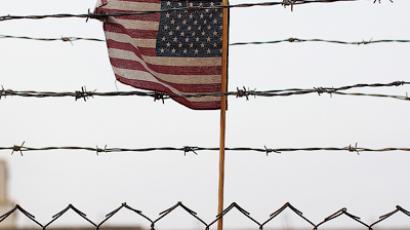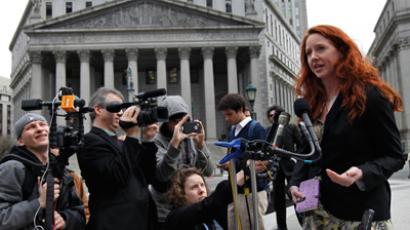White House continues fight to indefinitely detain Americans without charge under NDAA
Only hours after a US district judge made permanent an injunction that bans the indefinite military detention of Americans without charge, the White House said they’d appeal to continue their efforts to keep a controversial new law on the books.
On Thursday, the Obama administration acknowledged that they plan to challenge a ruling made only a day earlier by US District Court Judge Katherine Forrest that concreted an injunction she issued four months prior on a provision included in the 2012 National Defense Authorization Act , or NDAA. In May, Judge Forrest said the indefinite detention statute in the NDAA failed to “pass constitutional muster” and ordered a temporary block. On Wednesday, she made that injunction permanent, but not without raising objection once again from the Executive Branch."First Amendment rights are guaranteed by the Constitution and cannot be legislated away," Forrest wrote on Wednesday. "This Court rejects the Government's suggestion that American citizens can be placed in military detention indefinitely, for acts they could not predict might subject them to detention."Judge Forrest’s decision this week reaffirms her earlier ruling that prohibits the US government from abiding by the indefinite detention provision in the NDAA, a clause that allows for American citizens to be detained and held on the suspicion of supporting terrorists “or associated forces” until a very vague time frame described as only “until the end of hostilities.” After US President Barack Obama signed the legislation into law on New Year’s Eve, a team of journalists and activists challenged it in court. The White House had originally threatened to veto the act if it came onto President Obama’s desk, but the commander-in-chief signed it none the less on December 31, 2011. When he inked his name to the bill, the president acknowledged that he was authorizing it, “despite having serious reservations with certain provisions that regulate the detention, interrogation and prosecution of suspected terrorists.” On Thursday, the White House affirmed that they will continue their legal battle to ensure that those certain provisions remain intact.Carl Mayer, an attorney with The Mayer Law Group and legal counsel for the plaintiffs in the case, spoke with RT shortly after he found out that the White House plans to appeal the ruling. Despite the Obama administration’s warning, Mr. Mayer calls Judge Forrest’s latest decision “a huge and historic victory for democracy” and remains optimistic that further administrative efforts to challenge the injunction will be thwarted by the Justice Department.The Obama administration, Mr. Mayer says, “plan to appeal this to the Second Circuit and probably ultimately to the Supreme Court. We think this is ill advised because it contradicts President Obama’s campaign statements, it contradicts his criticism of his own legislation in his signing statement and he knows, as a former constitutional law professor, that this is wholly unconstitutional.”“Because the language is so vague in this law,” Mr. Mayer explains, “if any journalist or activist is seen as reporting or offering opinions about groups that could somehow be linked not just to al-Qaeda but to any opponent of the United States or even opponents of our allies” they could be imprisoned indefinitely.Mr. Mayer adds that “When Congress passes a law that is so vague, [it] always has a chilling effect on everyone’s speech and that is not permitted under our Constitution.”“You can’t chill a journalist’s speech; you can’t chill your speech or your colleague’s speech or your producer’s speech or other journalists who you work with by holding a Sword of Damocles over your head by threatening you of being detained by the military. That is something that you have a fundamental right to be protected by,” the lawyer says.Also up for debate, says Mayer, is the NDAA’s violation of the Constitution’s right to due process. “Let’s assume they thought a report,” says Mayer, “is engaged in expressive activity that supports terrorists.” Without Judge Forrest’s injunction, that activity could warrant not a federal investigation, but a federal intervention — one that ends up with a suspect behind prison indefinitely. “And that is not how the Constitution works,” he says. “The Constitution gives you those fundamental bedrock protections.”“You have a right to prove that that’s not true in front of a jury of your peers,” Mayer says.Separate from the District Court case against the NDAA, several states have introduced legislation on their own that blocks usage of the indefinite detention provision on a local level. In April, the Virginia legislature voted to approve an act that authorizes law enforcement agents within the state to reject the controversial detention provisions included in the NDAA.Similar efforts were introduced in Washington, Utah and elsewhere.Mr. Mayer says that while he expects to go back to court to fight the White House’s efforts to install the indefinite detention clause on a permanent basis, so far it seems as if their case is for a lost cause.“I think they are ill advised to appeal this at all,” he tells RT. “The Obama administration has now lost three times. They lost the temporary injunction, they lost the motion for reconsideration and they lost the hearing for permanent injunction. I say three strikes and you’re out.”














